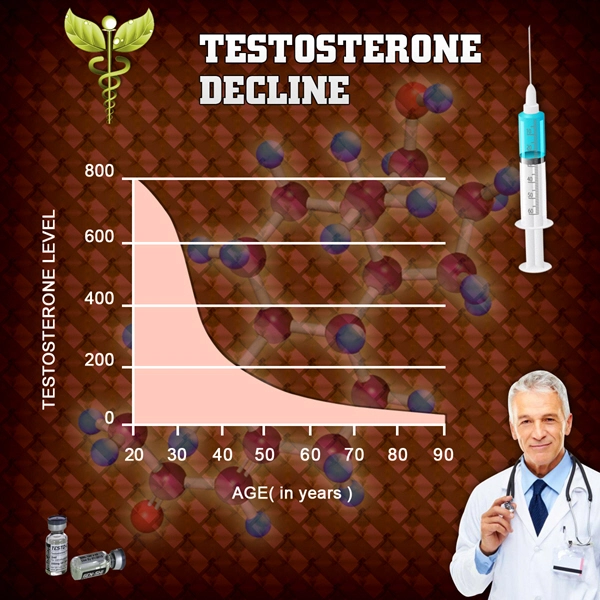Introduction
Testosterone, the primary male sex hormone, plays a crucial role in the development of male reproductive tissues and the maintenance of secondary sexual characteristics. Recent studies have begun to explore the connection between neonatal health and testosterone levels in adulthood, particularly in the context of low testosterone (low T) among American males. This article delves into the potential long-term effects of neonatal health on testosterone levels, offering insights into how early life conditions may influence male health outcomes.
The Importance of Neonatal Health
Neonatal health encompasses the well-being of a newborn during the first month of life. This period is critical as it sets the foundation for future health and development. Factors such as birth weight, gestational age, and exposure to stressors or infections can significantly impact a newborn's health trajectory. Research indicates that adverse neonatal conditions may have lasting effects on various physiological systems, including the endocrine system, which regulates hormone production.
Neonatal Health and Testosterone Production
The link between neonatal health and testosterone levels in adulthood is an area of growing interest. Studies have shown that low birth weight, a common indicator of neonatal health, is associated with lower testosterone levels later in life. For instance, a study published in the *Journal of Clinical Endocrinology & Metabolism* found that men who were born with low birth weight had significantly lower testosterone levels in adulthood compared to those born at normal weight.
The mechanism behind this association is not fully understood, but it is believed that early life stressors may affect the development of the hypothalamic-pituitary-gonadal (HPG) axis, which is responsible for testosterone production. Additionally, nutritional deficiencies or infections during the neonatal period may lead to epigenetic changes that alter gene expression related to hormone regulation.
Implications for Low Testosterone in American Males
Low testosterone is a prevalent issue among American males, with estimates suggesting that up to 40% of men over the age of 45 may experience low T. The condition can lead to a variety of symptoms, including decreased libido, fatigue, and muscle loss, significantly impacting quality of life.
Understanding the role of neonatal health in the development of low testosterone could provide new avenues for prevention and treatment. For instance, interventions aimed at improving neonatal health, such as better prenatal care and nutrition, could potentially mitigate the risk of low T in adulthood. Furthermore, early identification of at-risk individuals through neonatal screening could lead to targeted interventions that support healthy testosterone levels throughout life.
Current Research and Future Directions
Current research is focused on elucidating the specific pathways through which neonatal health influences testosterone levels. Longitudinal studies that follow individuals from birth to adulthood are crucial for understanding these long-term effects. Additionally, animal models are being used to explore the molecular mechanisms underlying the relationship between early life conditions and hormone regulation.
Future research should also consider the role of environmental factors, such as exposure to endocrine-disrupting chemicals during the neonatal period, which may further complicate the relationship between neonatal health and testosterone levels. By expanding our knowledge in these areas, we can develop more effective strategies to address low testosterone and improve the overall health of American males.
Conclusion
The impact of neonatal health on testosterone levels in American males is a complex and multifaceted issue. While the exact mechanisms are still being explored, the evidence suggests that early life conditions play a significant role in the development of low testosterone. By focusing on improving neonatal health, we can potentially reduce the prevalence of low T and enhance the well-being of future generations of American males. As research continues to advance, it is essential to remain vigilant and proactive in addressing this important public health concern.

- Environmental Toxins Linked to Declining Testosterone Levels in American Men [Last Updated On: March 4th, 2025] [Originally Added On: March 4th, 2025]
- Economic Burden of Low Testosterone on American Healthcare System [Last Updated On: March 17th, 2025] [Originally Added On: March 17th, 2025]
- Vitamin D's Role in Managing Low Testosterone in American Men: Insights and Strategies [Last Updated On: March 17th, 2025] [Originally Added On: March 17th, 2025]
- Low Testosterone in American Males: Symptoms, Causes, and Management Strategies [Last Updated On: March 18th, 2025] [Originally Added On: March 18th, 2025]
- Low Testosterone and Mood Disorders in American Men: Causes, Symptoms, and Treatments [Last Updated On: March 18th, 2025] [Originally Added On: March 18th, 2025]
- Chronic Illnesses and Their Impact on Testosterone Levels in American Males [Last Updated On: March 18th, 2025] [Originally Added On: March 18th, 2025]
- Low Testosterone's Impact on Muscle Health in American Males: Causes, Effects, and Treatments [Last Updated On: March 19th, 2025] [Originally Added On: March 19th, 2025]
- Low Testosterone in American Men: Symptoms, Diagnosis, and Treatment Options [Last Updated On: March 19th, 2025] [Originally Added On: March 19th, 2025]
- Alcohol Consumption's Impact on Testosterone Levels in American Men [Last Updated On: March 20th, 2025] [Originally Added On: March 20th, 2025]
- Low Testosterone and Diabetes in American Males: Impacts and Management Strategies [Last Updated On: March 20th, 2025] [Originally Added On: March 20th, 2025]
- Low Testosterone in Aging Men: Symptoms, Impacts, and Management Strategies [Last Updated On: March 21st, 2025] [Originally Added On: March 21st, 2025]
- Low Testosterone's Impact on Cognitive Function in American Men: Memory, Attention, and Executive Skills [Last Updated On: March 21st, 2025] [Originally Added On: March 21st, 2025]
- Smoking's Impact on Testosterone: A Critical Health Concern for American Men [Last Updated On: March 21st, 2025] [Originally Added On: March 21st, 2025]
- Low Testosterone's Impact on Skin Health in American Men: Causes and Management [Last Updated On: March 21st, 2025] [Originally Added On: March 21st, 2025]
- Shift Work's Impact on Testosterone Levels in American Men: Risks and Mitigation Strategies [Last Updated On: March 22nd, 2025] [Originally Added On: March 22nd, 2025]
- Zinc's Role in Boosting Testosterone Levels in American Men: A Comprehensive Overview [Last Updated On: March 23rd, 2025] [Originally Added On: March 23rd, 2025]
- Low Testosterone and Depression in American Males: Links, Implications, and Therapy [Last Updated On: March 23rd, 2025] [Originally Added On: March 23rd, 2025]
- Low Testosterone and Hair Loss: Impact and Management in American Males [Last Updated On: March 23rd, 2025] [Originally Added On: March 23rd, 2025]
- Boosting Testosterone in American Men Through Tailored Physical Activity [Last Updated On: March 23rd, 2025] [Originally Added On: March 23rd, 2025]
- Medications Impacting Testosterone Levels: Insights for American Men's Hormonal Health [Last Updated On: March 23rd, 2025] [Originally Added On: March 23rd, 2025]
- Weight Loss: A Key Strategy for Boosting Testosterone in American Males [Last Updated On: March 23rd, 2025] [Originally Added On: March 23rd, 2025]
- Herbal Supplements: A Natural Approach to Treating Low Testosterone in American Men [Last Updated On: March 23rd, 2025] [Originally Added On: March 23rd, 2025]
- Low Testosterone Linked to Osteoporosis Risk in American Men: Prevention and Treatment Insights [Last Updated On: March 24th, 2025] [Originally Added On: March 24th, 2025]
- Low Testosterone in American Males: Impact on Libido and Treatment Options [Last Updated On: March 24th, 2025] [Originally Added On: March 24th, 2025]
- Dietary Strategies to Boost Testosterone in American Men: Key Nutrients and Foods [Last Updated On: March 24th, 2025] [Originally Added On: March 24th, 2025]
- Genetic Factors in Low Testosterone Among American Males: Research and Implications [Last Updated On: March 24th, 2025] [Originally Added On: March 24th, 2025]
- Nutritional Deficiencies and Testosterone: Insights for American Males [Last Updated On: March 24th, 2025] [Originally Added On: March 24th, 2025]
- Low Testosterone and Prostate Health: Understanding Risks and Management Strategies [Last Updated On: March 24th, 2025] [Originally Added On: March 24th, 2025]
- Environmental Estrogens: Impact on Testosterone Levels in American Males [Last Updated On: March 25th, 2025] [Originally Added On: March 25th, 2025]
- Low Testosterone and Metabolic Syndrome: Impacts and Interventions in American Men [Last Updated On: March 25th, 2025] [Originally Added On: March 25th, 2025]
- Low Testosterone: Symptoms, Diagnosis, and Impact on Men's Quality of Life [Last Updated On: March 25th, 2025] [Originally Added On: March 25th, 2025]
- Low Testosterone: Impacts and Strategies for Managing Body Composition in American Males [Last Updated On: March 25th, 2025] [Originally Added On: March 25th, 2025]
- Low Testosterone and Anemia: Exploring the Link and Treatment in American Men [Last Updated On: March 25th, 2025] [Originally Added On: March 25th, 2025]
- Low Testosterone's Impact on Emotional Health in American Men: Insights and Solutions [Last Updated On: March 25th, 2025] [Originally Added On: March 25th, 2025]
- Chronic Inflammation's Impact on Testosterone Levels in American Males [Last Updated On: March 26th, 2025] [Originally Added On: March 26th, 2025]
- Chronic Stress Impact on Testosterone Levels in American Men: Management Strategies [Last Updated On: March 26th, 2025] [Originally Added On: March 26th, 2025]
- Low Testosterone's Impact on Immune Function in American Males: Insights and Interventions [Last Updated On: March 26th, 2025] [Originally Added On: March 26th, 2025]
- Low Testosterone and Thyroid Disorders: Exploring the Link in American Men [Last Updated On: March 26th, 2025] [Originally Added On: March 26th, 2025]
- Liver Health's Crucial Role in Managing Testosterone Levels in American Males [Last Updated On: March 27th, 2025] [Originally Added On: March 27th, 2025]
- Low Testosterone Linked to Insulin Resistance in American Men: Impacts and Strategies [Last Updated On: March 27th, 2025] [Originally Added On: March 27th, 2025]
- Low Testosterone Linked to Increased Heart Disease Risk in American Men [Last Updated On: March 27th, 2025] [Originally Added On: March 27th, 2025]
- Low Testosterone and Skin Health: Impacts and Management in American Men [Last Updated On: March 27th, 2025] [Originally Added On: March 27th, 2025]
- Hormonal Imbalance and Low Testosterone in American Males: Causes, Symptoms, and Treatments [Last Updated On: March 27th, 2025] [Originally Added On: March 27th, 2025]
- Sleep Apnea's Impact on Testosterone Levels in American Males: Causes and Solutions [Last Updated On: March 27th, 2025] [Originally Added On: March 27th, 2025]
- Chronic Pain's Impact on Testosterone Levels in American Males: A Comprehensive Analysis [Last Updated On: March 28th, 2025] [Originally Added On: March 28th, 2025]
- Managing Low Testosterone in Aging Men: Symptoms, Diagnosis, and Treatment Options [Last Updated On: March 28th, 2025] [Originally Added On: March 28th, 2025]
- Dental Health Impacts Testosterone Levels in American Males: Insights and Recommendations [Last Updated On: March 28th, 2025] [Originally Added On: March 28th, 2025]
- Low Testosterone Linked to Higher Autoimmune Disease Risk in American Men [Last Updated On: March 28th, 2025] [Originally Added On: March 28th, 2025]
- Low Testosterone Linked to Neurological Risks in American Men: Implications and Interventions [Last Updated On: March 28th, 2025] [Originally Added On: March 28th, 2025]
- Respiratory Health's Impact on Testosterone Levels in American Males: COPD and Asthma Effects [Last Updated On: March 29th, 2025] [Originally Added On: March 29th, 2025]
- Low Testosterone Linked to Increased Kidney Disease Risk in American Men [Last Updated On: March 30th, 2025] [Originally Added On: March 30th, 2025]
- Gut Health and Testosterone: A Vital Connection for American Men's Wellness [Last Updated On: March 30th, 2025] [Originally Added On: March 30th, 2025]
- Low Testosterone's Impact on Musculoskeletal Health in American Men: Risks and Interventions [Last Updated On: April 1st, 2025] [Originally Added On: April 1st, 2025]
- ENT Health's Crucial Role in Optimizing Testosterone Levels in American Males [Last Updated On: April 1st, 2025] [Originally Added On: April 1st, 2025]
- Low Testosterone Linked to Increased Eye Disorder Risk in American Men [Last Updated On: April 2nd, 2025] [Originally Added On: April 2nd, 2025]
- Reproductive Health's Impact on Testosterone Levels in American Men [Last Updated On: April 4th, 2025] [Originally Added On: April 4th, 2025]
- Low Testosterone and Hematological Risks in American Men: Insights and Management [Last Updated On: April 7th, 2025] [Originally Added On: April 7th, 2025]
- Understanding Low Testosterone: Causes, Diagnosis, and Management Strategies [Last Updated On: April 7th, 2025] [Originally Added On: April 7th, 2025]
- Low Testosterone's Impact on Urological Health in American Men: Risks and Management [Last Updated On: April 7th, 2025] [Originally Added On: April 7th, 2025]
- Low Testosterone Levels Linked to Higher Infection Risk in American Men [Last Updated On: April 8th, 2025] [Originally Added On: April 8th, 2025]
- Low Testosterone Linked to Psychiatric Disorders in American Men: Implications and Management [Last Updated On: April 9th, 2025] [Originally Added On: April 9th, 2025]
- Immune System's Role in Low Testosterone Among American Males: A Holistic View [Last Updated On: April 10th, 2025] [Originally Added On: April 10th, 2025]
- Managing Rheumatological Health to Address Low Testosterone in American Males [Last Updated On: April 10th, 2025] [Originally Added On: April 10th, 2025]
- Cancer's Impact on Testosterone Levels in American Men: Causes, Effects, and Management [Last Updated On: April 10th, 2025] [Originally Added On: April 10th, 2025]
- Testosterone Levels and Wound Healing in American Males: Impacts and Implications [Last Updated On: April 12th, 2025] [Originally Added On: April 12th, 2025]
- Trauma's Impact on Testosterone Levels in American Males: Physiological and Psychological Insights [Last Updated On: April 13th, 2025] [Originally Added On: April 13th, 2025]
- Low Testosterone's Impact on Surgical Outcomes in American Men: Risks and Recommendations [Last Updated On: April 13th, 2025] [Originally Added On: April 13th, 2025]
- Low Testosterone and Vascular Health: Impacts and Management in American Men [Last Updated On: April 13th, 2025] [Originally Added On: April 13th, 2025]
- Managing Low Testosterone: The Crucial Role of Anesthetic Health in American Males [Last Updated On: April 15th, 2025] [Originally Added On: April 15th, 2025]
- Low Testosterone Linked to Increased Allergic Reactions in American Men: Health Implications [Last Updated On: April 15th, 2025] [Originally Added On: April 15th, 2025]
- Low Testosterone in Men Linked to Increased Pediatric Disorder Risk in Offspring [Last Updated On: April 17th, 2025] [Originally Added On: April 17th, 2025]
- Low Testosterone in American Men Linked to Congenital Disorders: Implications and Management [Last Updated On: April 18th, 2025] [Originally Added On: April 18th, 2025]
- Prenatal Health's Impact on Testosterone Levels in American Males [Last Updated On: April 19th, 2025] [Originally Added On: April 19th, 2025]
- Low Testosterone and Genetic Disorders: Risks and Implications for American Men [Last Updated On: April 19th, 2025] [Originally Added On: April 19th, 2025]
- Testosterone's Role in Male Health: Development, Genetics, and Lifestyle Impacts [Last Updated On: April 19th, 2025] [Originally Added On: April 19th, 2025]
- Occupational Health's Impact on Testosterone Levels in American Males [Last Updated On: April 20th, 2025] [Originally Added On: April 20th, 2025]
- Low Testosterone's Impact on Geriatric Health in American Men: Detection and Management [Last Updated On: April 20th, 2025] [Originally Added On: April 20th, 2025]



List of USA state clinics - click a flag below for blood testing clinics.
Word Count: 609



















































